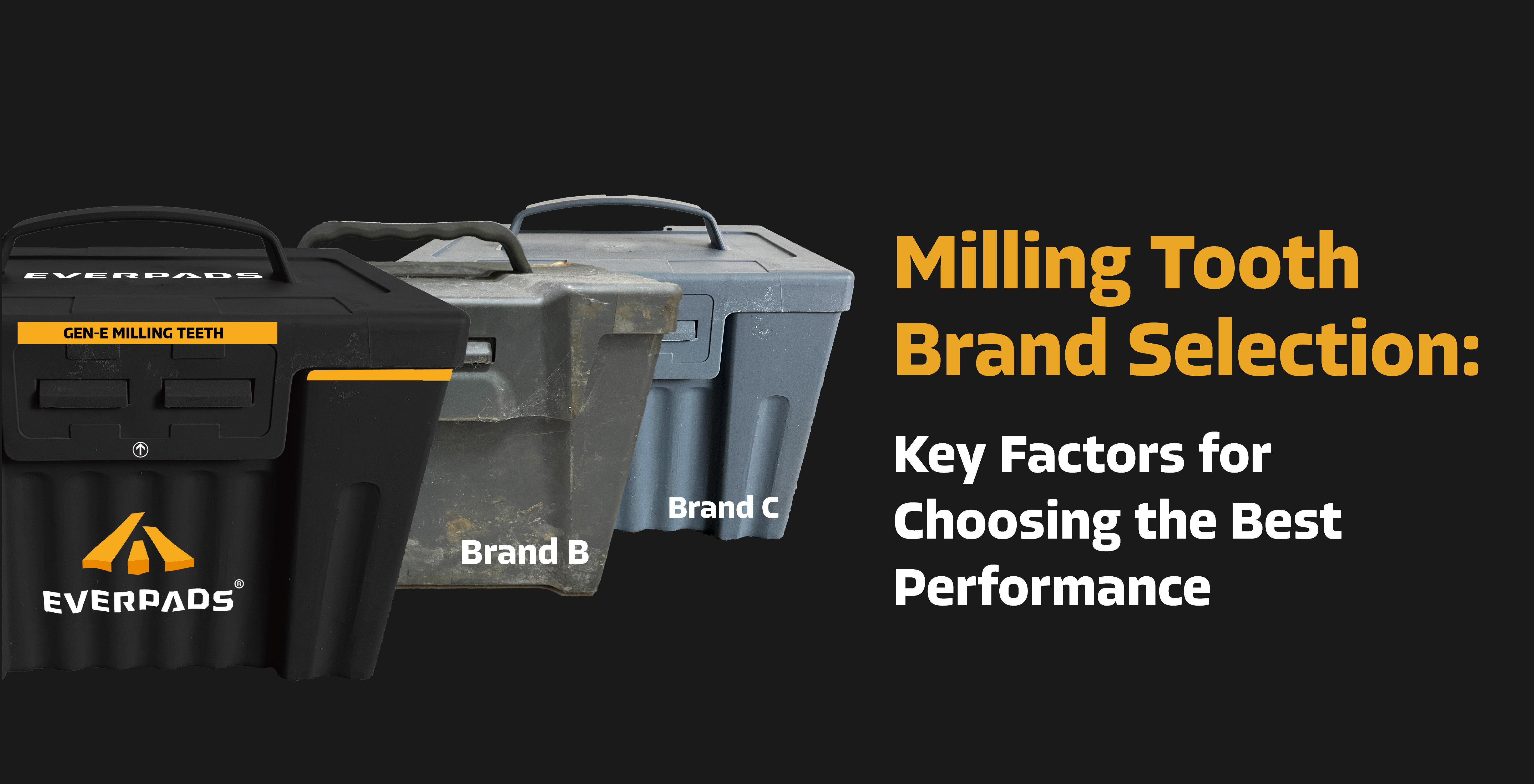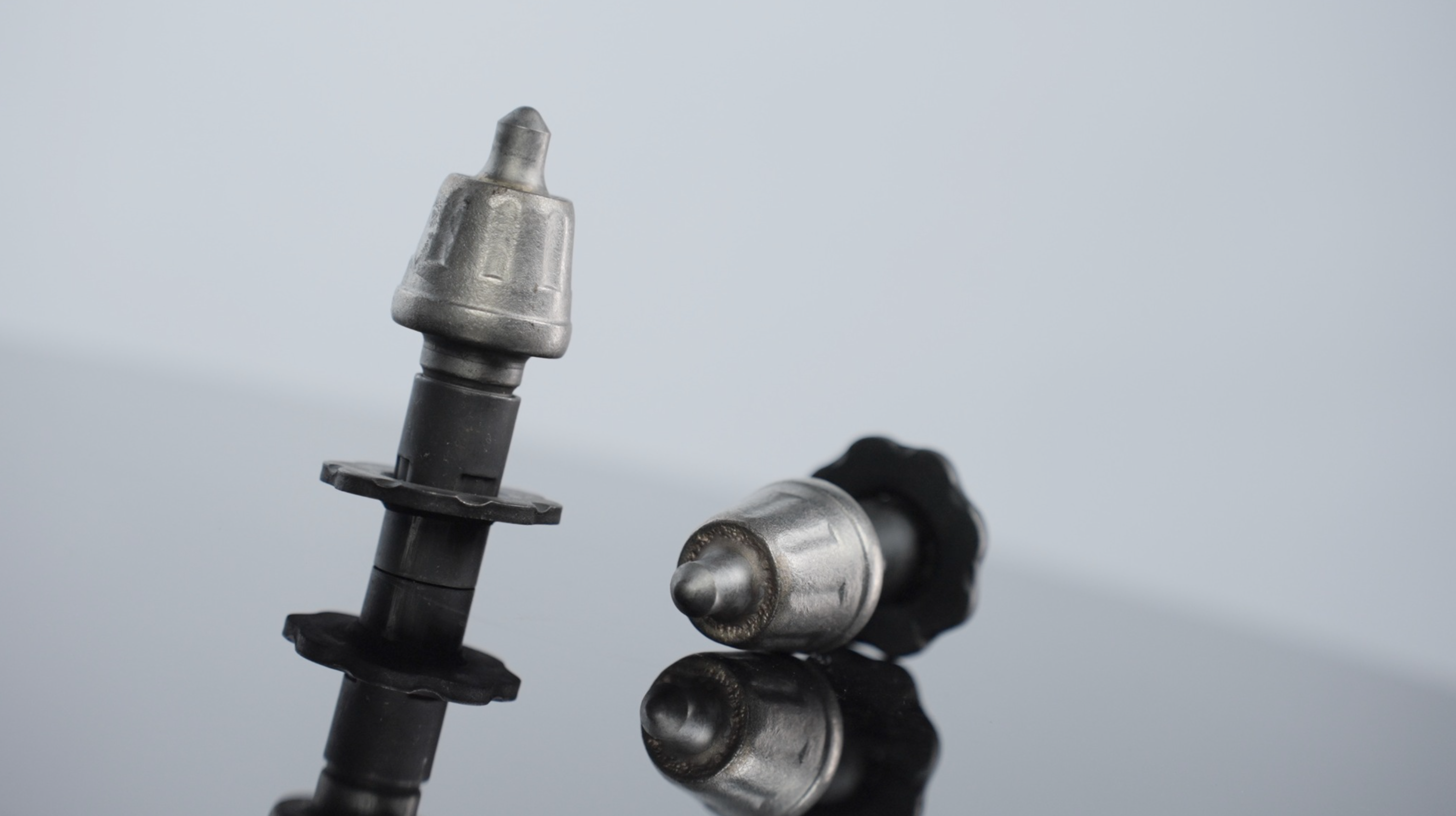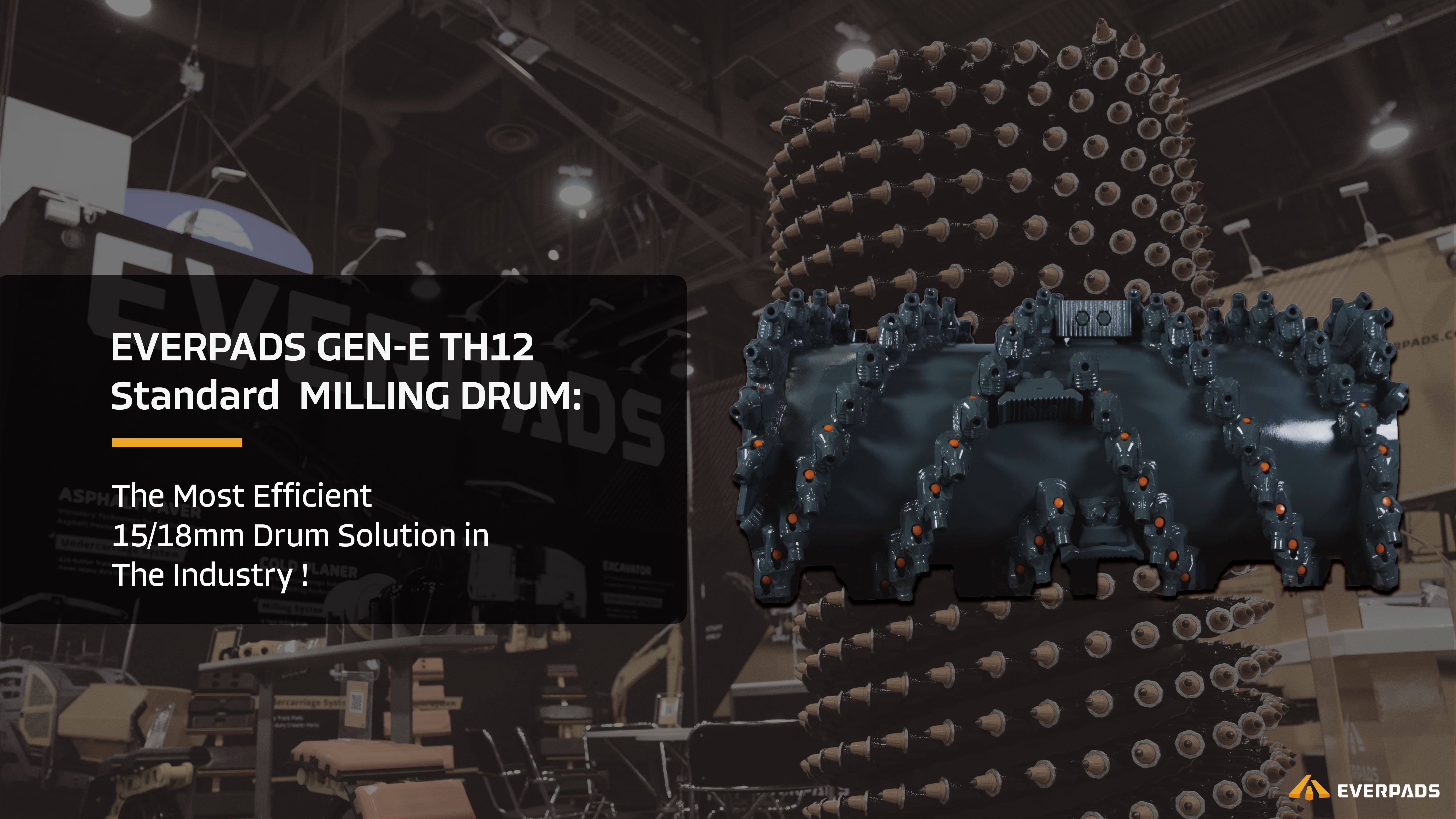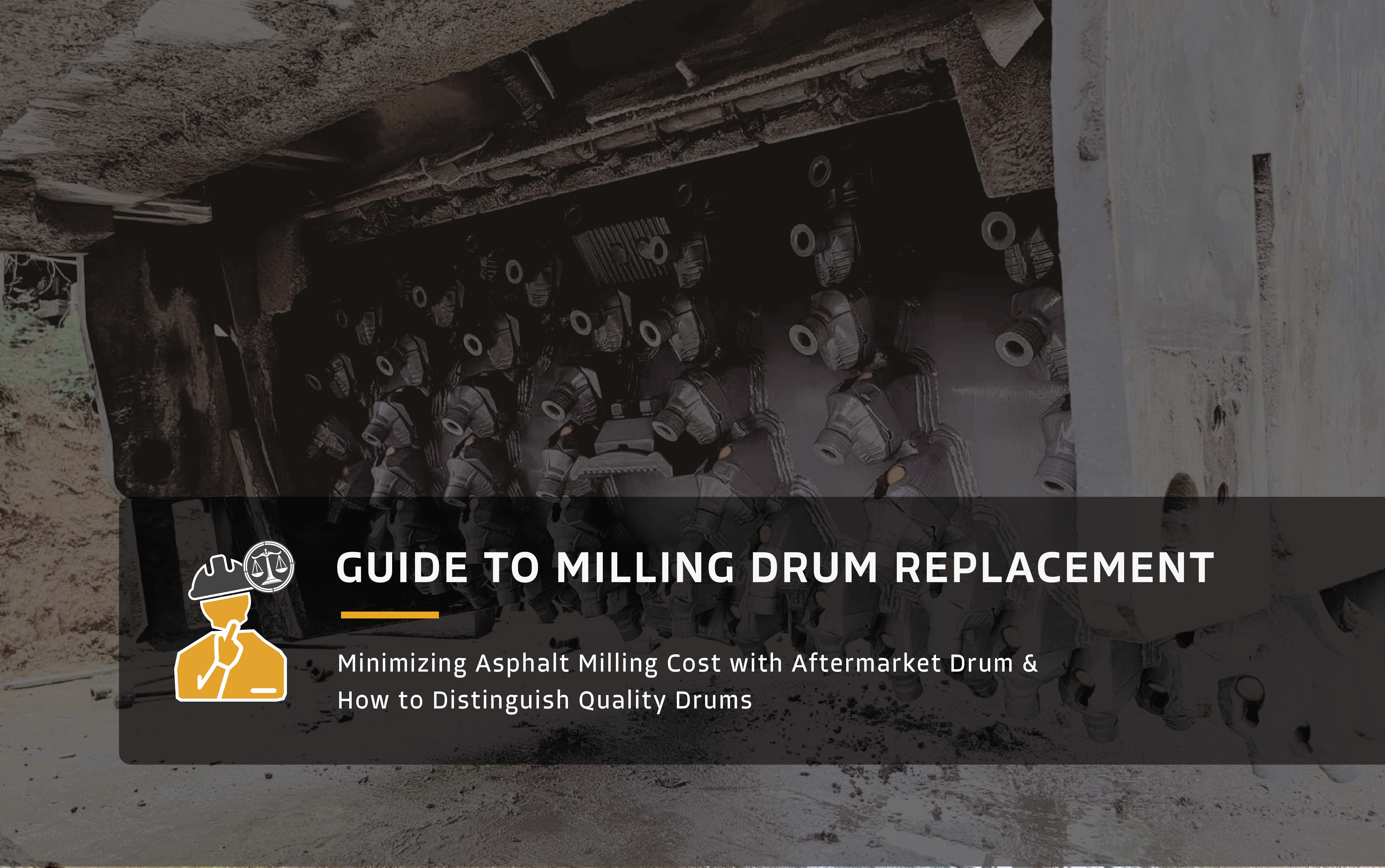Asphalt milling teeth play a critical role in road milling/ pavement milling. Choosing the right milling teeth and maintaining them after choosing the right machine is essential for efficiently removing worn-out or damaged asphalt surfaces, preparing roadbeds for new pavement, and ensuring the quality of the finished surface.
When selecting milling teeth, the first step is choosing a series with strong overall performance. Next, assess your specific project needs and select the model within that series that best fits your requirements. The final step is comparing specialized models from manufacturers that excel in fundamental teeth design before making your final selection.
This blog focuses on Step 1: How to evaluate a milling teeth manufacturer’s overall performance. Understanding the fundamentals of a strong milling teeth series ensures you start with a solid foundation before moving on to model-specific comparisons.
*If you want to know how to choose teeth for specific project conditions, read this:
[Optimized Your Part Selections: Choosing the Right Milling Teeth for Different Road Construction Projects]
- Understand assessment tips for asphalt milling teeth
- Replace the current milling teeth with a better option
- Maximizing asphalt milling efficiency
What You Will Learn from This Blog:
- The crucial role and impact of milling teeth on project efficiency.
- The functions and importance of each component in milling teeth.
- How to evaluate milling teeth based on key performance factors.
- Identify common challenges and learn how to overcome them.
- How to assess a manufacturer's capabilities and quality assurance.
Table of Contents:
1. Why Selecting Superior Asphalt Milling Teeth is Crucial for Maximizing Your Project Efficiency
2. The Anatomy of Asphalt Road Milling Teeth
3. Basic Consideration Indicators to Compare Asphalt Milling Teeth
4. Challenges for Milling Teeth to Address Each Indicator
5. How to Evaluate a Manufacturer's Capabilities in Asphalt Milling Teeth Production
6. Conclusion: Investing in the Right Asphalt Milling Teeth for Long-Term Success
I. Why Selecting Superior Asphalt Milling Teeth is Crucial for Maximizing Your Project Efficiency
Asphalt milling machine teeth, also known as milling bits or cutters, are critical components that directly affect milling results and are among the most costly spare parts for milling machines. A key component of cold milling machines is the large rotating drum, responsible for effectively removing asphalt and concrete layers. Using inferior milling teeth leads to high-frequency replacements, increasing long-term maintenance costs and expenses. Here are the main consequences of using inferior milling teeth:
- Poor Milling Results: These hurt contractors' business by extending project timelines, damaging reputations, leading to client dissatisfaction, and resulting in potential legal liabilities and safety risks.
- Frequent Teeth Replacement: Inferior teeth have a short service life, which increases long-term costs for spare parts and labor for machine maintenance.
- Unstable Project Schedule: Inferior teeth cause unexpected issues like sudden premature failures, requiring unscheduled downtime for replacements and delaying projects.
- Huge Hidden Costs: The combined issues generate substantial hidden costs in road construction, difficult to calculate immediately but significant over the long term, yet entirely avoidable.
In conclusion, selecting superior asphalt milling teeth is crucial for maximizing project efficiency, minimizing hidden costs, and ensuring long-term success in road construction projects.
II. The Anatomy of Asphalt Road Milling Teeth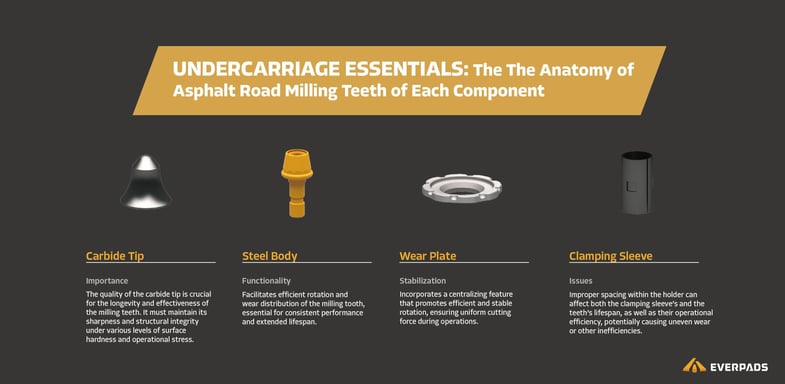
Asphalt milling teeth consist of carbide tips, steel body, wear plate, and sleeve. Each component plays a crucial role and requires specific features to deal with challenges while milling. Here we will unveil each component's roles and the consequences of its failure to the milling teeth:
Carbide Tip
- Role: Acts as the cutting edge of the milling teeth, responsible for penetrating tough materials like asphalt.
- Material: Primarily made from tungsten carbide, known for its exceptional durability and hardness.
- Importance: The quality of the carbide tip is crucial for the longevity and effectiveness of the milling teeth. It must maintain its sharpness and structural integrity under various levels of surface hardness and operational stress.
Learn how to select Carbide Tips
Steel Body
- Role: Provides structural support to the carbide tip and plays a pivotal role in the assembly of the milling tooth.
- Material: Constructed from high-strength steel or steel alloys designed to withstand the intense stress of milling operations.
- Functionality: Facilitates efficient rotation and wear distribution of the milling tooth, essential for consistent performance and extended tool life.
Wear Plate
- Role: Offers critical support between the tooth body and the sleeve, aiding in force transmission.
- Protection: Designed to shield tool holders from impacts and stresses that could cause damage.
- Stabilization: Incorporates a centralizing feature that promotes efficient and stable rotation, ensuring uniform cutting force during operations.
Clamping Sleeve
- Role: Connects the milling teeth to the tool holder, ensuring stability throughout the operation.
- Function: Maintains necessary tension between the tool holder and the teeth, critical for precise and effective milling.
- Issues: Improper spacing within the holder can affect both the clamping sleeve’s and the teeth’s lifespan, as well as their operational efficiency, potentially causing uneven wear or other inefficiencies.
By understanding the crucial roles and materials of these components, you can appreciate why superior quality in each part is essential for optimal performance and durability in asphalt milling operations.
III. Basic Consideration Indicators to Compare Asphalt Milling Teeth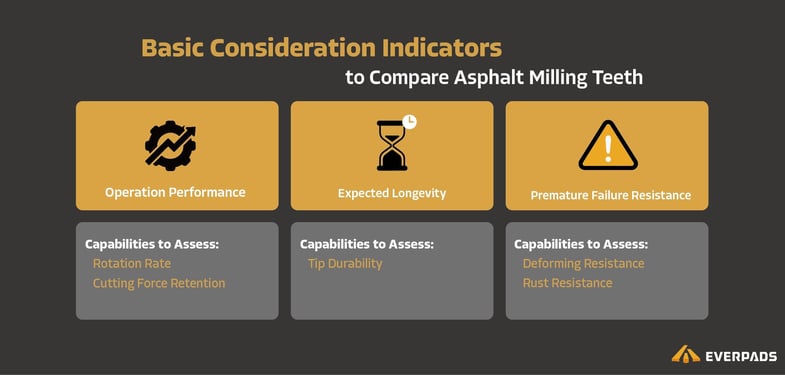
When selecting asphalt milling teeth, it's essential to consider multiple performance indicators, which can be categorized into three main areas: Operational Performance, Expected Longevity, and Premature Failure Resistance. Here's an explanation of how these indicators function in practice and the issues they address:
1. Operation Performance:
The customer works in various project with different road condition (hardness, weather) and milling depth. The most critical indicator is the milling teeth rotation efficiency.
- Capabilities to Assess:
- Rotation Rate: Refers to the speed and efficiency at which the milling teeth rotate as they contact the surface material. A higher rotation rate helps distribute wear evenly across the teeth, enhancing cutting efficiency.
Learn more about tooth rotation - Cutting Force Retention: Maintaining strong cutting force is crucial for the effective grinding of tough materials, ensuring consistent performance throughout the operation.
Learn more about Tooth Cutting Force
- Rotation Rate: Refers to the speed and efficiency at which the milling teeth rotate as they contact the surface material. A higher rotation rate helps distribute wear evenly across the teeth, enhancing cutting efficiency.
2. Expected Longevity
- Capabilities to Assess:
- Tip Durability: The durability of the carbide tips is the most critical factor affecting the lifespan and effectiveness of milling teeth when compared to well-designed teeth. High-quality, durable tips ensure a longer service life and sustained cutting performance, reducing the frequency of replacements and downtime.
Learn more about Tooth Durability
- Tip Durability: The durability of the carbide tips is the most critical factor affecting the lifespan and effectiveness of milling teeth when compared to well-designed teeth. High-quality, durable tips ensure a longer service life and sustained cutting performance, reducing the frequency of replacements and downtime.
3. Premature Failure Resistance:
This is mostly due to the teeth' partial wear caused by rotation failure.
- Capabilities to Assess:
- Deforming Resistance: The ability to resist deformation under operational stress is essential for maintaining the functionality and shape of the milling teeth.
- Rust Resistance: Rust on the sleeve and steel body can cause materials to get stuck in the rotation space, leading to operational inefficiencies. Ensuring rust resistance helps maintain smooth operation and prolongs the life of the teeth.
IV. Challenges for Milling Teeth to Address Each Indicator
1. Operational Performance
Indicator 1. Rotation Rate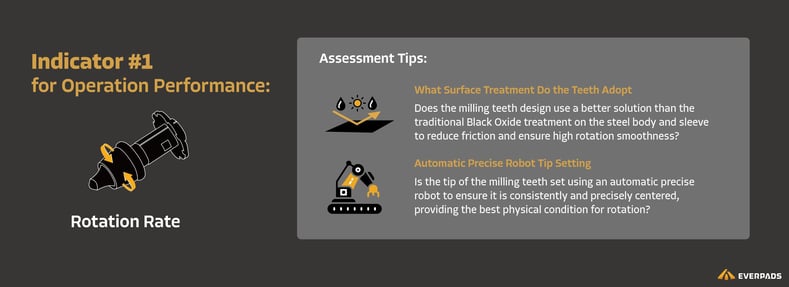
- Challenges:
- Proper Space Setting and Smoothness: Achieving a high rotation rate requires precise space settings and high smoothness between the shank of the steel body and the sleeve.
- Precise Production and High-Cost Surface Treatment: These two requirements necessitate precise production and high-cost surface treatments, which most manufacturers do not perform.
- Centered Tip and Self-Centering Ability: A precisely centered tip on the steel body and self-centering ability in the tool holder also affect the rotation efficiency of the teeth.
- What Surface Treatment Do the Teeth Adopt: Does the milling teeth design use a better solution than the traditional Black Oxide treatment on the steel body and sleeve to reduce friction and ensure high rotation smoothness?
- Automatic Precise Robot Tip Setting: Is the tip of the milling teeth set using an automatic precise robot to ensure it is consistently and precisely centered, providing the best physical condition for rotation?
Indicator 2. Cutting Force Retention: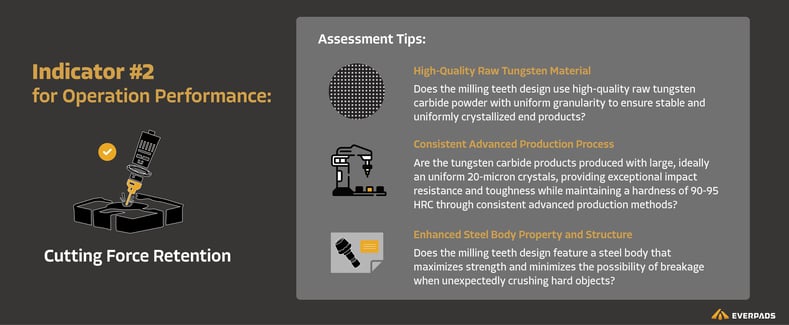
- Challenges:
- Consistent Cutting Force: Maintaining consistent cutting force over time requires advanced material technology and precision manufacturing.
- Resistance to Wear and Deformation: The tips must resist dulling from wear and deformation with a hardness that balances durability and elasticity, requiring tungsten carbide products to have uniform crystals of the expected granularity.
- High-Quality Materials: Achieving this balance requires high-quality, uniform raw tungsten materials, which are expensive.
Assessment Tips:
- High-Quality Raw Tungsten Material: Does the milling teeth design use high-quality raw tungsten carbide powder with uniform granularity to ensure stable and uniformly crystallized end products?
- Consistent Advanced Production Process: Are the tungsten carbide products produced with large, ideally an uniform 20-micron crystals, providing exceptional impact resistance and toughness while maintaining a hardness of 90-95 HRC through consistent advanced production methods?
- Enhanced Steel Body Property and Structure: Does the milling teeth design feature a steel body that maximizes strength and minimizes the possibility of breakage when unexpectedly crushing hard objects?
2. Expected Longevity
Indicator 3. Tip Durability: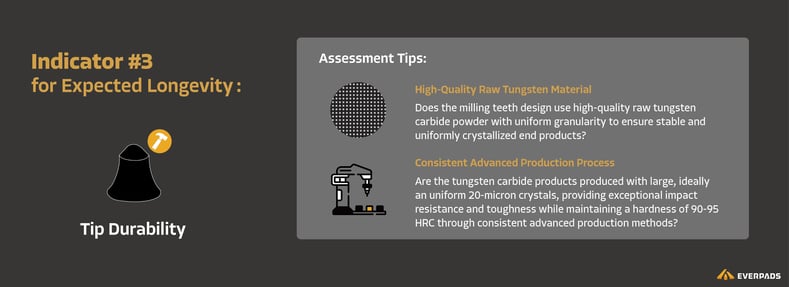
- Challenges:
- High-Quality, Wear-Resistant Materials: Enhancing tip durability requires the use of high-quality, wear-resistant materials and advanced manufacturing capabilities.
- Uniformity in Material Quality: Ensuring uniformity in material quality is essential for consistent performance and durability.
- Optimal Balance Between Hardness and Toughness: Achieving the optimal balance between hardness and toughness to prevent chipping or cracking under stress is technically challenging.
- High-Quality Raw Tungsten Material
- Consistent Advanced Production Process
3. Premature Failure Resistance
Indicator 4. Deforming Resistance: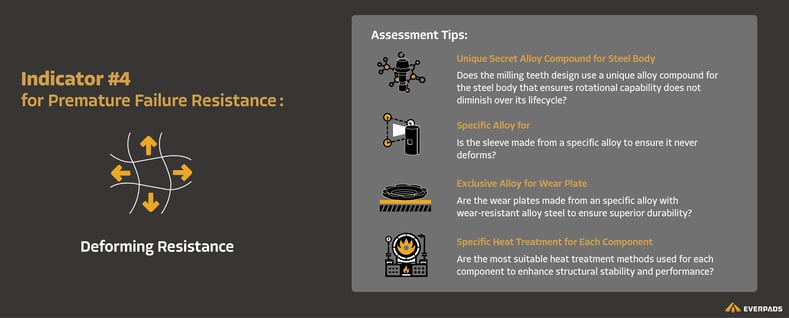
- Challenges:
- Extreme Forces and Environmental Conditions: Milling teeth are subjected to extreme forces and varying environmental conditions, making deforming resistance difficult to achieve.
- Robust Material Requirements: The material used must be exceptionally robust to withstand these conditions.
- Meticulous Heat Treatment: Heat treatment processes must be meticulously controlled to enhance the structural stability of the teeth, requiring sophisticated engineering and testing.
- High Costs: These processes and material selections are very expensive, leading most manufacturers to avoid them to keep production costs down.
Assessment Tips:
- Unique Secret Alloy Compound for Steel Body: Does the milling teeth design use a unique alloy compound for the steel body that ensures rotational capability does not diminish over its lifecycle?
- Specific Alloy for Sleeve: Is the sleeve made from a specific alloy to ensure it never deforms?
- Exclusive Alloy for Wear Plate: Are the wear plates made from an specific alloy with wear-resistant alloy steel to ensure superior durability?
- Specific Heat Treatment for Each Component: Are the most suitable heat treatment methods used for each component to enhance structural stability and performance?
Indicator 5. Rust Resistance:
- Challenges:
- Rust Issues: Most manufacturers use Black Oxide to address rust issues because of its low cost.
- Ineffectiveness of Black Oxide: This method is less effective in preventing rust and ensuring long-term durability.
- Investment Challenges: It is challenging for manufacturers to invest in more effective rust prevention methods due to high costs.
Assessment Tips:
- What Surface Treatment Do the Teeth Adopt: Does the milling teeth design use a better solution than the traditional Black Oxide treatment on the steel body and sleeve to reduce friction and ensure high rotation smoothness?
Explore Everpads solution for cutting tool: Everpads Technology- Gen-E Milling Teeth
V. How to Evaluate a Manufacturer's Capabilities in Asphalt Milling Teeth Production
When it comes to milling teeth production, it is crucial that manufacturers have advanced equipment for precise production and deep insight into each component's design. Here are key factors to consider when evaluating a manufacturer's capabilities:
- Advanced Equipment:
Does the manufacturer use state-of-the-art machinery and technology to ensure precise production of milling teeth? - Research and Development:
Does the manufacturer demonstrate a deep understanding of the principles of asphalt milling and use scientific methods to address challenges? - Component-Specific Design:
Is there evidence that the manufacturer designs each component specifically for its role in the milling process? - Testing and Quality Assurance:
Does the manufacturer conduct rigorous testing of their milling teeth to ensure durability and performance? - Experience and Expertise:
How extensive is the manufacturer's experience in producing milling teeth? Do they have a track record of successful projects and satisfied customers?
By digging into a manufacturer's content and observing whether they genuinely research and apply scientific methods to solve challenges, you can better assess their capabilities. Additionally, ensuring that the manufacturer tests their teeth and has sufficient experience is crucial for determining their ability to produce high-quality milling teeth.
VI. Conclusion: Investing in the Right Asphalt Milling Teeth for Long-Term Success
Selecting the right asphalt milling teeth is crucial for maximizing project efficiency, reducing hidden costs, and ensuring long-term success in road construction. Superior milling teeth improve milling results, reduce the need for frequent replacements, stabilize project schedules, and offer significant cost savings.
By understanding the anatomy of milling teeth and evaluating them based on operational performance, expected longevity, and premature failure resistance, you can make informed decisions. Additionally, assessing a manufacturer's capabilities through their equipment, research, design, testing, and experience ensures high-quality production.
Following these guidelines will help you invest in the best milling teeth for efficient, cost-effective, and successful road milling projects.
Finally, you can see how Everpads delivers these requirements through our blog: Everpads Technology: The Most Efficient Asphalt-Cutting Solution on the Market - Gen-E Milling Teeth.
.png?width=698&height=417&name=%E5%AE%98%E7%B6%B2logo%20(1).png)
